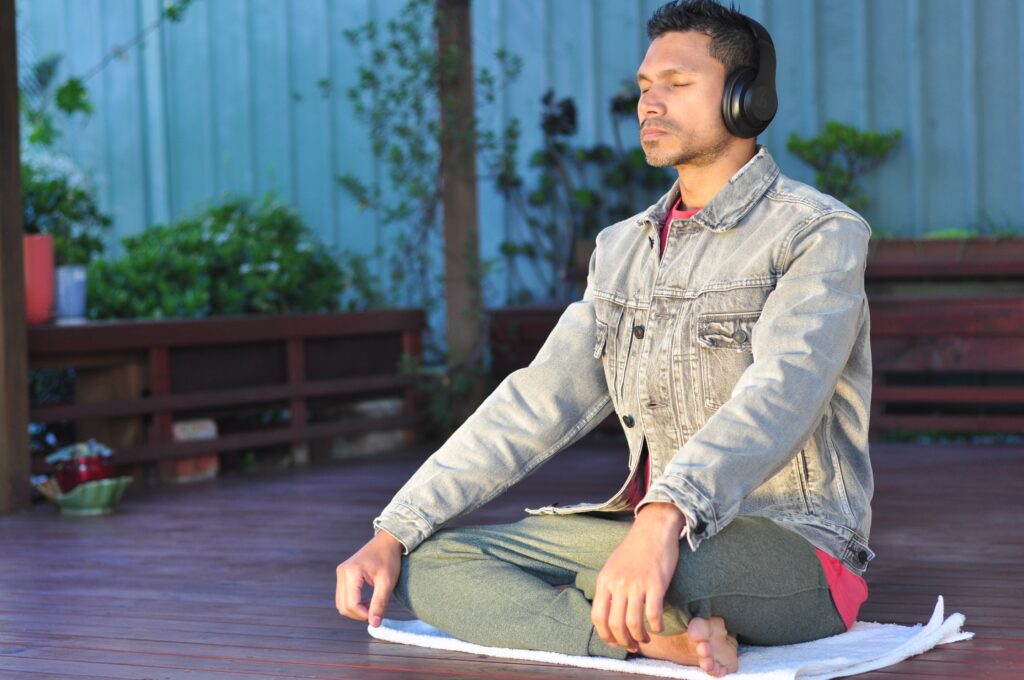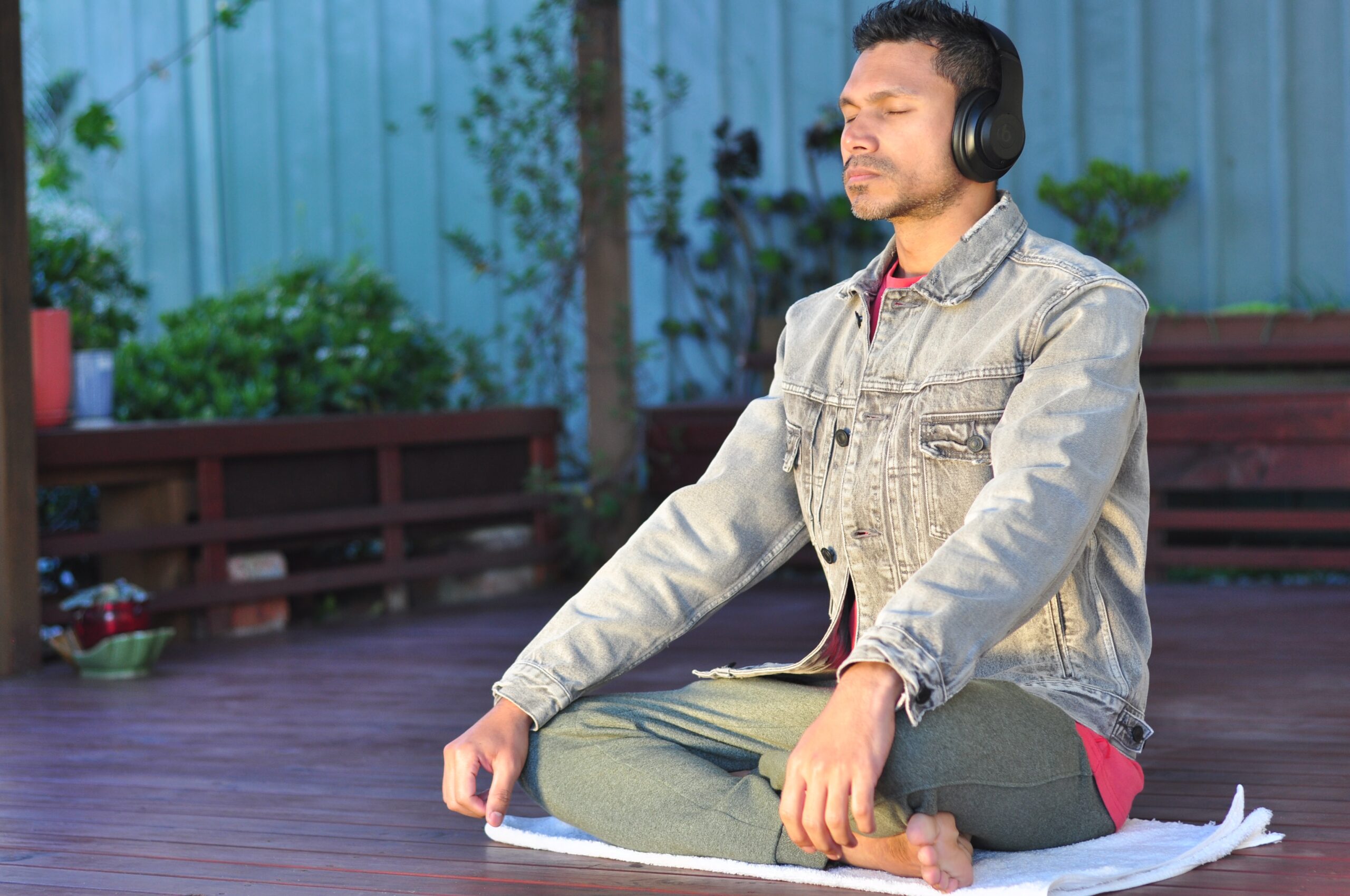Introduction
Many introverts are on a unique journey, transforming their lives through mindful practices like meditation. This article dives into how meditation can play a pivotal role in an introvert’s life, fostering a quiet mind while leading a vibrant and fulfilling life. Whether you’re deeply introspective or just starting to explore the inner workings of your mind, this guide is a straightforward, analytical look at meditation practices tailored for introverts. Discover how meditation can be a tool in the introvert to extrovert transition, helping to balance introspection with outward engagement, and leading to a richer, more connected life. 📚✨

The Natural Connection Between Introverts and Meditation
Introverts often find themselves drawn to activities that allow for deep reflection and introspection, making meditation a natural fit. With a propensity for inner thought and a need for solitary time, introverts can use meditation as a way to recharge and find balance in a world that can sometimes feel overwhelming. It’s not about changing who they are, but rather, enhancing their inherent qualities. Meditation offers a quiet space for introverts to connect with their thoughts and feelings, providing clarity and a sense of calm. The practice encourages mindfulness, helping introverts to cultivate a heightened awareness of their inner experiences. This can lead to a better understanding of their needs and desires, and a stronger sense of self. It’s a process that requires patience and consistency, qualities that many introverts naturally possess. The key is to start small and find a style of meditation that resonates, whether it be through guided sessions, focusing on the breath, or simply sitting in silence. For those new to meditation, there’s an advanced introvert test available that can help guide you toward the practices that may suit your personality best. It’s a simple step towards embracing meditation and unlocking the benefits it holds for introverts. The practice isn’t just about finding quiet—it’s about discovering a vibrant, enriched life that complements the introverted nature. Through meditation, introverts can learn to navigate their inner world with ease, finding peace and vitality in the quietude of their own minds.

The Basics of Meditation
Starting with meditation may seem daunting at first, especially for introverts who thrive in structured environments. However, the basics of meditation are quite simple and can be easily adapted to suit individual preferences. The first step is to find a quiet and comfortable space where interruptions are minimal. This could be a corner of a room, a chair, or even a spot in a local park. The key is consistency, so try to meditate at the same time each day to establish a routine. Start with short sessions, perhaps five to ten minutes, and gradually increase the duration as you become more comfortable with the practice. Focus on your breath, observing its natural rhythm without trying to change it. Your mind will inevitably wander, but that’s completely normal. The practice comes in gently bringing your attention back to your breath each time you notice your thoughts have strayed. Over time, this practice can help to quiet the mind and create a sense of calmness and stability. For those looking to discuss and learn more about meditation, joining the intro to extro community can be a great way to share experiences and gain insights from others on a similar journey. Meditation is a skill, and like any skill, it takes time to develop. However, the benefits are well worth the effort, leading to a more centered and balanced life. With patience and persistence, introverts can harness the power of meditation, turning inward reflection into outward vibrance.

The Role of Breath in Meditation
Breathing is a natural and vital part of life, yet it is often overlooked, especially when it comes to meditation. For introverts delving into meditation practices, understanding and harnessing the power of breath can be transformative. Breathing serves as a bridge between the mind and body, creating a sense of harmony and balance. By focusing on the breath, introverts can anchor themselves in the present moment, cutting through the noise of their internal dialogues and the external world.
The practice starts with observing the breath, noticing its pace, depth, and rhythm. It’s not about changing how you breathe, but rather being aware of it. This mindful observation brings a sense of calmness, as the mind quiets and the body relaxes. As introverts, this practice can be particularly beneficial, offering a respite from overthinking and creating space for clarity and insight.
One effective technique is diaphragmatic breathing, where the focus is on deepening the breath and engaging the diaphragm. This type of breathing can reduce stress and promote a sense of inner peace, something many introverts crave. It’s a simple yet powerful tool that can be used anywhere, at any time, providing instant access to a state of tranquility.
For those looking to delve deeper into the transformative journey of meditation, the intro to extro roadmap provides a comprehensive guide, different from other resources, offering unique insights tailored for introverts. This roadmap serves as a valuable companion, guiding introverts through the nuances of meditation and breathing practices, ensuring a rewarding and fulfilling experience.
Through consistent practice, introverts can learn to harness the power of their breath, using it as a tool to navigate the ups and downs of life with grace and ease. The breath becomes a constant companion, providing strength, stability, and a quiet mind, paving the way for a vibrant life.

Meditation and Social Interaction: Finding the Balance
Introverts often navigate social situations differently than their extroverted counterparts, typically preferring meaningful one-on-one interactions over large group settings. Meditation can play a crucial role in helping introverts find a balance between their need for solitude and the inevitable social interactions of daily life. By cultivating a sense of inner calm and stability through meditation, introverts can approach social situations with a grounded presence, reducing feelings of overwhelm or exhaustion.
The practice of meditation teaches introverts to observe their thoughts and feelings without immediate reaction, creating space between stimulus and response. This space allows for clearer thinking and a more measured approach to social interactions, fostering positive and meaningful connections. It encourages a mindful approach to communication, where introverts can be fully present, listen attentively, and respond thoughtfully.
Furthermore, meditation can help introverts to recharge after social engagements. By taking time to sit in silence and reconnect with their inner world, introverts can replenish their energy and restore their sense of balance. This practice becomes a sanctuary, a place of rest and rejuvenation.
Meditation also aids in building resilience against the sensory overload that can often accompany social settings. Through regular practice, introverts can strengthen their ability to remain calm and centered, even in the midst of chaos. They learn to navigate the ebb and flow of social interactions with grace, embracing their introverted nature while building the capacity for vibrant and fulfilling relationships.
By integrating meditation into their daily routine, introverts can find a balance that honors their need for solitude while enhancing their ability to engage in meaningful social interactions. The quiet mind cultivated through meditation becomes a source of strength, enabling a life of connection, vibrancy, and fulfillment.
Building a Consistent Meditation Practice
Establishing a consistent meditation practice is crucial, especially for introverts, as it lays the foundation for experiencing the long-term benefits of mindfulness and inner tranquility. Building this habit requires commitment, but the process can be both enjoyable and deeply rewarding.
Start by setting a realistic goal, keeping in mind that even just a few minutes of meditation each day can make a significant difference. Choose a specific time and place for your practice, creating a routine that signals to your mind and body that it’s time to unwind and focus inward. Consistency is key, as it builds momentum and helps to solidify meditation as a non-negotiable part of your daily life.
For introverts, incorporating meditation into existing routines can be an effective strategy. This could mean meditating for a few minutes after waking up, during a midday break, or before going to bed. By anchoring meditation to already established habits, you create natural triggers that remind you to practice, making it easier to stay consistent.
It’s also important to be patient and kind to yourself, recognizing that building a new habit takes time. There will be days when meditation feels challenging, and your mind may seem particularly busy. Acknowledge these moments without judgment, and gently bring your focus back to your breath or chosen point of concentration.
Remember that the goal of meditation is not to empty the mind, but to cultivate awareness and presence. As an introvert, this practice can be particularly nurturing, providing a space for introspection and self-discovery.
By committing to a consistent meditation practice, introverts can harness the power of mindfulness, leading to a quieter mind and a more vibrant, fulfilling life. This practice becomes a steadfast companion, supporting personal growth and inner peace.
Overcoming Common Meditation Challenges for Introverts
While meditation offers numerous benefits, it’s not without its challenges, even for introverts who naturally incline towards introspection. Recognizing and addressing these hurdles is essential to maintaining a consistent practice and reaping the full rewards of mindfulness.
One common challenge is dealing with a wandering mind. It’s normal for thoughts to arise during meditation, but they can become a distraction. Instead of getting frustrated, learn to observe these thoughts without attachment, gently guiding your focus back to your breath or chosen point of concentration. This practice of redirection fosters mental resilience and enhances your ability to stay present.
Another challenge introverts might face is the misconception that they should excel at meditation right away due to their introspective nature. This expectation can lead to self-criticism and discouragement. Remember that meditation is a skill that requires time and patience to develop, regardless of your personality type.
Introverts may also struggle with integrating meditation into their daily routine. To overcome this, start with short sessions, gradually increasing the duration as you become more comfortable. Establishing a specific time and place for your practice can also aid in building consistency.
It’s important to find a style of meditation that resonates with you. There are various techniques available, from mindfulness and breath awareness to guided meditations. Experiment with different methods to discover what works best for you, and be open to adjusting your practice as needed.
By addressing these challenges head-on and maintaining a compassionate and patient attitude towards yourself, introverts can cultivate a fulfilling meditation practice. This practice becomes a source of strength, providing mental clarity, emotional balance, and a deeper connection to oneself.
The Long-term Benefits of Meditation for Introverts
As introverts embark on their meditation journey, the long-term benefits of this practice become increasingly apparent. Over time, the moments of quietude and introspection transform into a consistent state of calm and clarity, significantly enhancing the quality of life.
One of the most profound benefits is increased self-awareness. Meditation encourages introspection, helping introverts to understand their thoughts, emotions, and behaviors more clearly. This deeper understanding leads to greater emotional intelligence, enabling them to navigate life’s challenges with grace and resilience.
Improved focus and concentration are also notable benefits. The practice of bringing the mind back to the present moment, time and time again, sharpens the ability to sustain attention. For introverts, this enhanced focus can translate into improved productivity and creativity in both personal and professional endeavors.
Stress reduction is another key advantage of a consistent meditation practice. By promoting a state of relaxation and encouraging a non-reactive awareness, meditation helps to lower stress levels and reduce the impact of stress on the body and mind. This is particularly beneficial for introverts, who may be more prone to feeling overwhelmed in high-stress situations.
Additionally, meditation fosters a sense of inner peace and contentment. As introverts learn to find stillness within, regardless of external circumstances, they cultivate a sense of stability and equanimity. This inner tranquility contributes to a richer, more vibrant life, filled with meaningful connections and fulfilling experiences.
By committing to a consistent meditation practice, introverts unlock a world of benefits that extend far beyond the moments of practice. They experience a transformation, not just in how they interact with the world, but in how they experience and perceive life itself. The quiet mind cultivated through meditation becomes a foundation for a life of vibrancy, balance, and profound contentment.
Conclusion
Meditation emerges as a powerful practice for introverts, offering a sanctuary of calm in a bustling world and a path to deeper self-awareness and balance. By embracing this practice, introverts can enhance their natural tendencies towards introspection, turning inward to find strength, clarity, and a vibrant way of living.
The journey of meditation is unique to each individual, and introverts, in particular, may find a kindred spirit in the quietude and mindfulness that it brings. Whether it is navigating social interactions with grace, building resilience against stress, or simply finding a moment of peace in a hectic day, meditation provides the tools necessary for thriving in both personal and professional realms.
With patience, consistency, and a willingness to explore the inner workings of the mind, introverts can unlock the full potential of meditation, transforming their lives from the inside out. The quiet mind becomes a source of power, paving the way for a life that is not just lived, but truly experienced in all its depth and vibrancy.
By dedicating time to this practice, introverts prove that a quiet mind does not equate to a silent life. On the contrary, it opens the doors to a vibrant life, rich with insight, connection, and the profound tranquility that comes from truly knowing oneself. So, embrace the journey, cherish the moments of stillness, and watch as your life unfolds into a beautiful tapestry of mindfulness and vibrant living.



